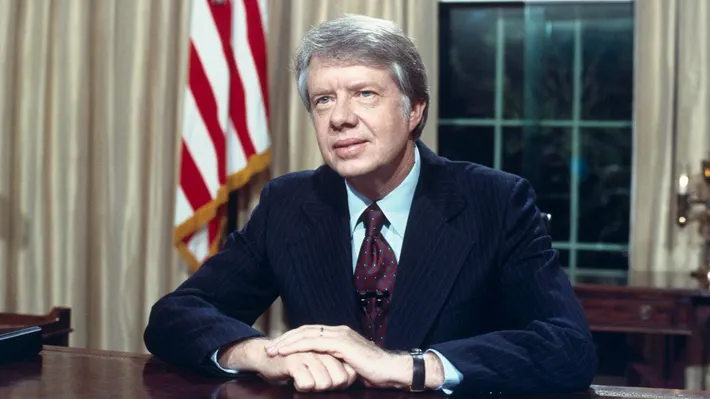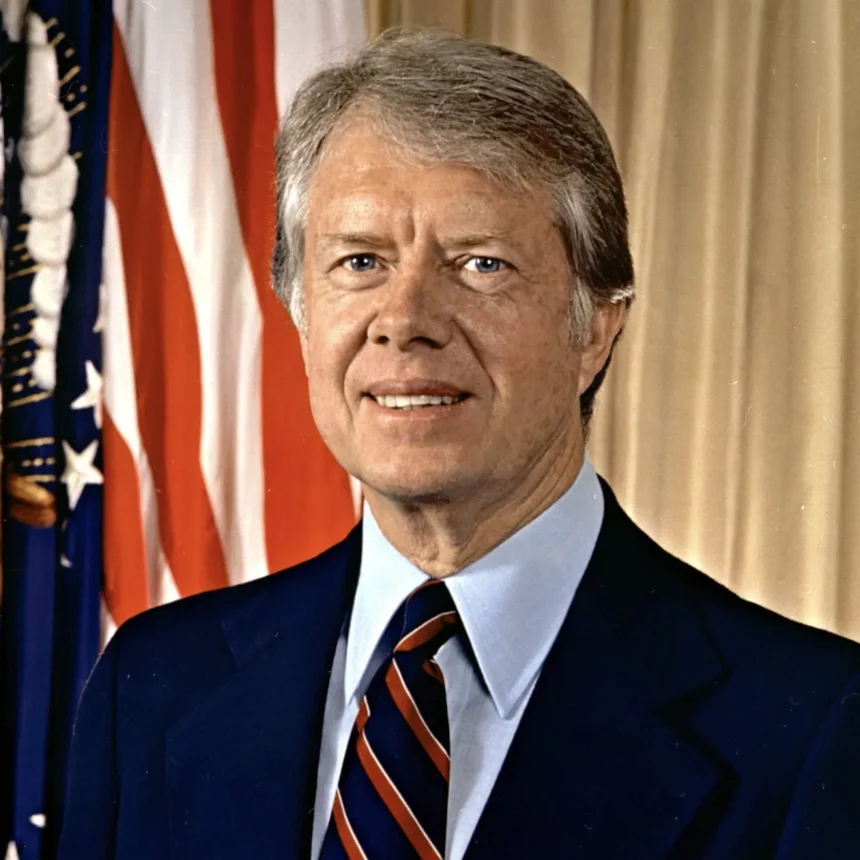Jimmy Carter, the 39th President of the United States and a revered figure in global politics and humanitarianism, passed away peacefully on December 29, 2024, at his home in Plains, Georgia. At 100 years old, he was the longest-living U.S. president in history, leaving behind a legacy of leadership, peace advocacy, and public service.
Early Life and Career
Born on October 1, 1924, James Earl Carter Jr. grew up in the small town of Plains, Georgia, where his family ran a peanut farming business. Carter excelled academically, earning an appointment to the U.S. Naval Academy, where he graduated in 1946. He served in the Navy until 1953, working on submarines and pioneering nuclear-powered naval technology under Admiral Hyman Rickover.
In 1953, Carter returned to Plains to manage his family’s farm after his father’s passing. His transition from military service to agricultural management laid the foundation for his interest in politics and public service, as he became deeply involved in his local community.
Entry into Politics
Carter began his political career in the Georgia State Senate, serving from 1963 to 1967. As a state senator, he advocated for civil rights, government reform, and rural development, earning a reputation as a progressive leader.

In 1971, he became the 76th governor of Georgia, championing racial integration, environmental conservation, and government efficiency. These achievements set the stage for his national political ambitions.
Presidency (1977–1981)
In 1976, Carter launched a grassroots campaign for the presidency, emphasizing transparency, honesty, and his status as a Washington outsider. He defeated incumbent President Gerald Ford to become the 39th President of the United States.
Carter’s presidency was marked by significant foreign policy achievements. The Camp David Accords, which established peace between Egypt and Israel, stand as one of his most enduring accomplishments. He also prioritized human rights, placing them at the center of U.S. foreign policy.
However, Carter faced domestic challenges, including economic difficulties marked by inflation and energy crises. The Iran hostage crisis, where 52 American diplomats were held captive for 444 days, further tested his administration and overshadowed his achievements, contributing to his defeat by Ronald Reagan in the 1980 election.
Post-Presidential Legacy
After leaving office, Carter dedicated himself to humanitarian efforts and philanthropy, earning widespread admiration for his post-presidency activities. In 1982, he founded the Carter Center, an organization committed to advancing human rights, democracy, and global health. Through the center, Carter worked tirelessly to combat diseases such as Guinea worm and malaria, oversee democratic elections worldwide, and mediate conflicts.
His dedication to affordable housing through his partnership with Habitat for Humanity also earned him recognition as a hands-on leader who remained committed to improving the lives of the underprivileged.
In 2002, Carter was awarded the Nobel Peace Prize for his work in fostering peace, promoting democracy, and advancing social justice. His post-presidency became a model of how former leaders can continue to serve humanity.
Personal Life
Jimmy Carter married Rosalynn Smith in 1946, and the couple shared a remarkable 77 years of marriage. They were partners in every aspect of their lives, from politics to humanitarian work. Rosalynn Carter passed away in 2023, just a year before her husband.
The Carters were known for their deep connection to their hometown of Plains, Georgia, where they lived a simple life, teaching Sunday school and engaging with their community.
Global Tributes
Jimmy Carter’s passing has elicited an outpouring of tributes from leaders and citizens worldwide. President Joe Biden hailed him as a “remarkable leader and peacemaker,” while former President Barack Obama praised his unwavering commitment to justice and democracy.
World leaders, including French President Emmanuel Macron and Canadian Prime Minister Justin Trudeau, acknowledged Carter’s contributions to peace and humanity. Across the globe, Carter was remembered as a champion of the underprivileged and a tireless advocate for peace.

Final Farewell
Plans for Carter’s memorial include a state funeral, with his body lying in state at the U.S. Capitol and a service at the Washington National Cathedral. He will be interred in his hometown of Plains, Georgia, beside his beloved wife Rosalynn.
A Legacy of Peace and Service
Jimmy Carter’s life epitomized integrity, compassion, and a relentless pursuit of peace. His presidency, while challenging, reflected his commitment to human rights and diplomacy. His post-presidential work set a new standard for global humanitarianism, making him one of the most respected statesmen of the 20th and 21st centuries.
As the world bids farewell to Jimmy Carter, his legacy endures as a testament to the power of humility, service, and unwavering dedication to the betterment of humanity




